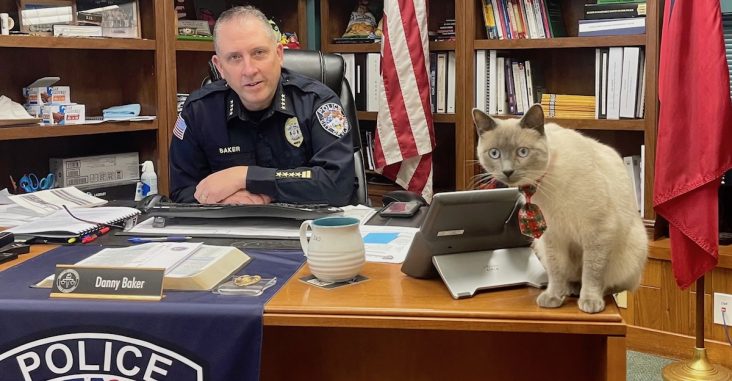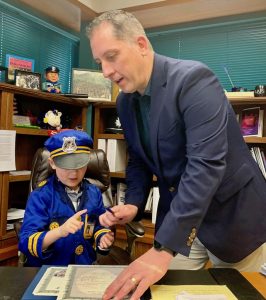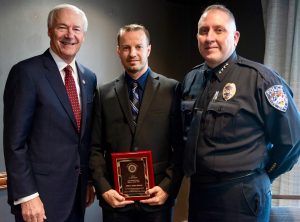Chief Baker talks about ‘pivotal’ points in his career, the community policing push
by October 24, 2022 3:25 pm 2,104 views

Fort Smith Police Chief Danny Baker in his office with Pawfficer Fuzz.
It’s been a series of career challenges for Danny Baker ever since his career with the Fort Smith Police Department (FSPD) began in 2001. The east Oklahoma native and Army National Guard veteran was at the police training academy in Camden, Ark., when the towers fell.
“We watched that live at the academy. I knew things were going to be different when I came back (to Fort Smith),” said Baker, a 26-year veteran of police work who has been the Fort Smith police chief for a little more than three years. “I came to Fort Smith and started working and everything was upside down.”
Baker, 49, said the police force began providing security at the Fort Smith Regional Airport and other places and buildings that were not part of any patrols on Sept. 10, 2001. Just a few years later, Hurricane Katrina in 2005 would send thousands of refugees from New Orleans and other parts of southern Louisiana to Fort Chaffee. Baker was one of the officers to pull many 12-hour shifts for multiple weeks patrolling Chaffee to provide security.
“Those were long, long days,” Baker, a father to five girls with two grandchildren, said during a recent interview with Talk Business & Politics.
Danny Martinez was Baker’s lifelong friend. They grew up together as kids in the same small town. Baker helped Martinez get hired as a Fort Smith police officer in July 2006. Less than a year later Martinez would be killed while responding to a domestic disturbance call.
“That was definitely a pivotal point for me in my career. … I was honored to speak at his funeral. But I became more reflective. I thought more about my purpose in life,” Baker said.
Did he consider leaving police work after Martinez was killed?
“Yes. And I’ve had that thought multiple times in my career. But you know, that’s probably true of anyone who has been in this job for any length of time,” Baker said, with his wife Becky nodding in agreement.
The pressure also is on an officer’s family.
“Life is not easy if you’re married to a police officer. … Your whole family is involved,” Becky said.
‘BAD BEHAVIOR’
In the midst of mourning Martinez, Baker was having to navigate what would become a “bad culture environment” under then Police Chief Kevin Lindsey. Lindsey was hired in January 2007, and would resign in March 2016 after revelations of inappropriate racial comments were the last straw in a controversial administration. Lindsey was almost fired in early 2008, but survived when then Fort Smith City Administrator Randy Reed resigned when he was unable to muster support for his decision to fire Lindsey.

Baker said Lindsey allowed strong personalities within the department to play fast and easy with the rules, resulting in what he described as “silos of bad behavior.”
Lindsey was followed by Nathaniel Clark, the city’s first black police chief. Not only was Clark’s race an issue with some officers, but Clark’s focus on addressing the department’s culture resulted in several departures. Baker said he tried to convince some of his friends on the force to stay.
“I said, ‘Look, give this guy a chance. We don’t know who he is or how he is going to lead. Why would you walk away from a career just because of this one guy?’” Baker said.
But many left, including some of his friends. Did some officers leave because of Clark’s race?
“Absolutely,” Baker said, adding that there was a “sense of entitlement” among some officers who grew accustomed to controlling their own little kingdoms within the department. “It was a difficult time. I’m not going to lie.”
FLOOD CONDITIONS
And then the historic flooding of April and May 2019 hit Fort Smith. Clark had resigned and Baker was the interim chief. The FSPD was down more than 40 police officers. That difficult time would soon become a tough period in which Baker said he was reminded of why he was a police officer.
“Everyone, from commanders on down, everyone stepped up. We cancelled days off and vacations. We worked long days. … It was definitely a team-building exercise,” Baker said.
The flood was a trigger for Baker. Prior to the natural disaster, he was not interested in being the police chief. He was looking forward to returning to head of special operations or some other leadership role within the department.
“You know, I thought, ‘I’ve led them through this. Maybe doing this together is the best thing for us. Maybe this is what I should be doing instead of falling back into the sidelines,’” he said.

Fast forward to September and Fort Smith City Administrator Carl Geffken, who conducted a nationwide search for a new chief, named Baker as the chief. Baker knew he wanted to pursue a community approach to policing, and began working toward that, knowing there would be resistance among officers with more of an authoritarian “gun and badge” view of policing.
COMMUNITY FOCUS
And then George Floyd was murdered May 25, 2020, by Minneapolis Police Department officers. Protests emerged immediately in that city and around the country, including Fort Smith. Baker met with protestors to allow for several peaceful assemblies, including the “All Cops Are Bastards” (ACAB) group. During their protest on a hot summer day, Baker asked the owner of two snow cone trailers to come to where the protesters were. A protest that could have become a problem was diffused. He received some criticism from inside and outside the department about the action, including the cost to buy snow cones for protestors.
“How much did it cost? It was a whole lot less than tear gas, plus it’s effective. It cost a lot less than all the time we’d have in taking people to jail,” Baker said.
It wasn’t just Floyd. For several years prior to Baker being chief, the nation had seen a growing number of either questionable, unconstitutional and/or fatal police actions.
“After awhile, you should be able to see what doesn’t work. So you think, ‘Let’s try something else.’ You stop looking at yourself like an occupying force and start looking for solutions and bring success to the community, because if it turns out to be good for the community, it’s going to be good for us (FSPD),” Baker said.
Thus began what Baker said has been a culture shift, in which the goal is to change from a “warrior to a guardian mentality.” There were 572 violent crime incidents in the city in 2017, with 549 in 2019, and rising to 704 in 2020. But the number fell to 323 in 2021, with significant declines in rape, robbery and aggravated assault.
The change has been noticed outside of Fort Smith.
Little Rock attorney Matt Campbell spent about four years pursuing the FSPD with Freedom of Information Act requests and lawsuits related to various allegations of discrimination and illegal police practices.
“From 2013 to 2017 or so, when I was writing extensively about the Fort Smith Police Department, Danny Baker was one of the very few high-ranking FSPD officers that I knew I could trust. When I heard that he had been named chief, I had high hopes that we might actually see changes and improvement in the then-dysfunctional FSPD, and that appears to be exactly what has happened. After all, I used to receive near-weekly calls and emails about issues big and small with the FSPD. Since Baker became chief, I can’t recall the last time someone contacted me about the FSPD,” Campbell said.
MORE TO DO
Despite what he sees as positive changes in Fort Smith, Baker remains concerned about policing nationwide. He’s not optimistic it’s on a good path.
“It (policing practices nationwide) was getting better. Changes were happening, but it seems things have slowed, and that really worries me,” Baker said, suggesting that divisive national politics are partially responsible for rejection of community policing in some states and cities. “We’re still seeing too many egregious incidents that shouldn’t be happening.”
As to what’s next, Baker said there is more to do in establishing the guardian culture and connecting to the community. He said the FSPD has not achieved all the community-policing goals, but said most officers, including commanders, have bought in to the approach and deserve much of the credit for department successes. He said they realize if community policing works to improve safety and security for the city, “it’s also working for them personally.” Baker points to being almost fully staffed – 162 out of 164 uniformed officer slots are full as of Oct. 21 – and a lower turnover rate as proof the culture creates an attractive workplace.
“And we’re also bringing in more recruits who like what we’re doing, who like our culture,” Baker said, adding that the interest is happening even before the department is set to receive a broad almost 24% pay increase in the city’s 2024 budget. “The changes here, and with them (community partners), I think, are awe inspiring. We have come through a lot of fires and have risen through the ashes.”
